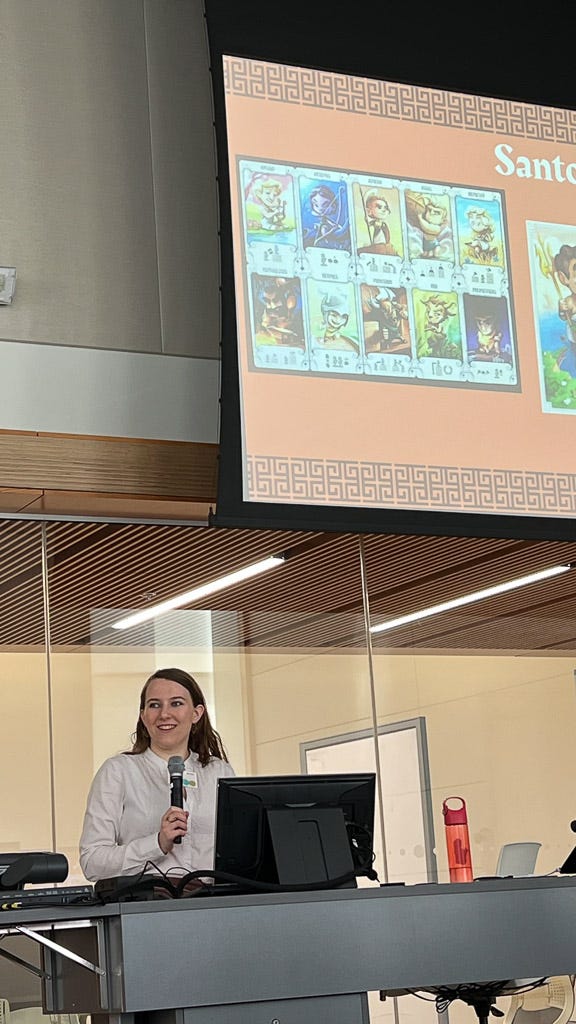What is A Reception Collection?
Glad you asked! A Reception Collection is a place where I write about ancient Mediterranean history and myth, and how they get depicted in modern culture. I’m interested in popular culture like movies, video games, and novels, but I’m not constrained by medium. If something is fairly contemporary, engages with the ancient Mediterranean past, and piques my interest, I’ll write about it and share it with you.
By “fairly contemporary,” I mean “from the last several centuries.” To date, the oldest media I’ve discussed on A Reception Collection is music from the early 1600s:
I mostly write about works from the late 20th and early 21st centuries: that being said, people have been engaging with antiquity in interesting ways since long before then, and I like to explore older receptive media from time to time.
Because I grew up in Canada and my family have French and Scottish heritage, I’m mostly familiar with antiquity-themed media that comes from Europe and North America. That’s been reflected in my post history so far: however, I’m fascinated by portrayals of the ancient Mediterranean from around the world, and I’m slowly familiarizing myself with works from other continents. If you know a piece of relevant media you think I should check out, feel free to leave a comment on one of my posts, or join my chat.
Who’s writing this?
My name is Nina Houle; I’m currently a graduate student at Simon Fraser University in Vancouver, Canada. My upcoming thesis (scheduled for defence in July 2025) is about portrayals of ancient Greece and Rome in modern tabletop gaming.
At the time of writing, scholarship on this topic is fairly limited. Plenty of academics study ancient themes within modern culture, and a growing number of scholars write about tabletop gaming. However, not many people have combined the two until now.
Since there’s not a lot of existing scholarship on how tabletop games depict the ancient Mediterranean, my thesis research has to cast a wide net. I’ve been reading about how Greco-Roman antiquity gets portrayed in film, in video games, in literature, and in all sorts of other interesting places.

Lots of my research isn’t going to make the final cut of my thesis, but I still wanted a place to write about what I’ve discovered. I also wanted a more casual, accessible place to share my findings, outside of academic writing. Thus, A Reception Collection was born!
What to Expect Here?
A Reception Collection (allegedly) updates with a new post every week. More on that below, under “How to Stay Updated?”. Here’s a short list of the types of post I make, that land straight in your email inbox if you subscribe.
-Reception Radio: short (~2 minute read) posts about antiquity-inspired music.
-Reception in Poetry: equally short posts, each one highlighting a poem inspired by antiquity.
-My mainline posts: longer-form analysis and commentary on all sorts of media. Sometimes, to mix things up, I write top 10 lists and rating-and-ranking articles, but most of my mainline posts read like informal essays.
-I Have Some Thoughts: scattershot, purposefully unorganized opinions. I usually write these in the spur of the moment to capture my immediate reactions to something I’ve done or seen.
-Reception in Pictures: photo-gallery posts with captions.
-Field Notes and An Update On _: reports on my academic adventures, including conference visits, public lectures, and more.
What is Reception?
Broadly speaking, reception is the idea that media gets interpreted and re-contextualized when people engage with it. Sometimes, pieces of media can themselves be works of reception; for example, a movie based on a book.
Historical reception happens when a piece of media engages with the past in some way; maybe it’s a story that takes place in a historical period, maybe it’s a retelling of a myth set in modern times, maybe it’s something else.
Ancient Mediterranean reception is a specific offshoot of historical reception. As the name suggests, it happens when a piece of media has something to do with ancient Greece, Egypt, Rome, or another society from that part of the world.
Why the term “Ancient Mediterranean?”
You might be more familiar with the term “classical” to refer to all things ancient Greek and Roman; think of phrases like “classical mythology,” “classical studies,” or “classical art.”
“Ancient Mediterranean” is more inclusive of other historical cultures who influence us to this day; the Egyptians, Etruscans, Phoenicians, Hittites, and more are all excluded from the term “classical",” which tends to only cover the Greeks and Romans. Western society has a long history of putting Greek and Roman civilization on a pedestal, at the expense of other cultures. This means that all kinds of art from around the world takes cues from Greco-Roman culture in interesting ways; however, it also means that other peoples have been historically sidelined in fields like archaeology and art history.
This doesn’t mean that we should stop engaging with ancient Greek and Roman culture; far from it! We should, however, be aware that the Greeks and Romans interacted with many other peoples, and that the Mediterranean has always been a multicultural meeting place. Part of this awareness involves thinking critically about the language we use when discussing ancient civilizations; for me, that includes replacing “classical” with “Ancient Mediterranean”.
How to stay updated?
If you subscribe for free, A Reception Collection posts get delivered straight to your inbox. You can also read my publication archives to catch up on older posts.
I am a busy grad student with a thesis on the way, so my post schedule can be a little erratic. That being said, I aim for a new blog post delivered to your inbox every Thursday morning.
To learn more about the tech platform that powers this publication, visit Substack.com.



